双语:为什么人文学科不应被摒弃
人文学科并没有过时英语作文
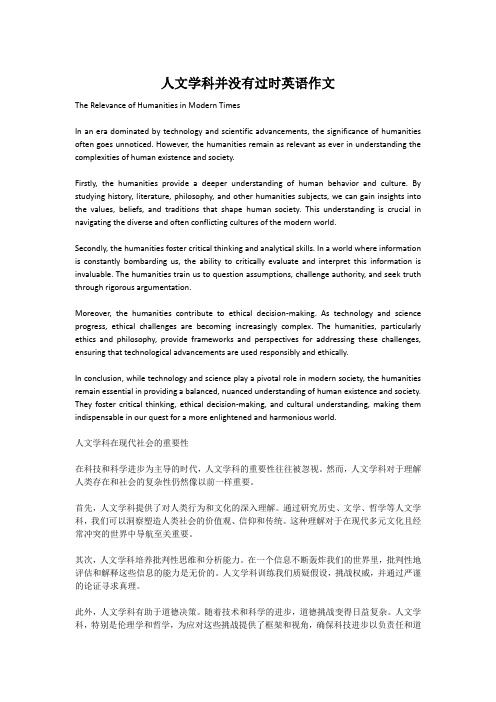
人文学科并没有过时英语作文The Relevance of Humanities in Modern TimesIn an era dominated by technology and scientific advancements, the significance of humanities often goes unnoticed. However, the humanities remain as relevant as ever in understanding the complexities of human existence and society.Firstly, the humanities provide a deeper understanding of human behavior and culture. By studying history, literature, philosophy, and other humanities subjects, we can gain insights into the values, beliefs, and traditions that shape human society. This understanding is crucial in navigating the diverse and often conflicting cultures of the modern world.Secondly, the humanities foster critical thinking and analytical skills. In a world where information is constantly bombarding us, the ability to critically evaluate and interpret this information is invaluable. The humanities train us to question assumptions, challenge authority, and seek truth through rigorous argumentation.Moreover, the humanities contribute to ethical decision-making. As technology and science progress, ethical challenges are becoming increasingly complex. The humanities, particularly ethics and philosophy, provide frameworks and perspectives for addressing these challenges, ensuring that technological advancements are used responsibly and ethically.In conclusion, while technology and science play a pivotal role in modern society, the humanities remain essential in providing a balanced, nuanced understanding of human existence and society. They foster critical thinking, ethical decision-making, and cultural understanding, making them indispensable in our quest for a more enlightened and harmonious world.人文学科在现代社会的重要性在科技和科学进步为主导的时代,人文学科的重要性往往被忽视。
儿童教育双语不用教了

儿童教育双语不用教了在当今社会,越来越多的家长意识到双语教育的重要性。
他们明白,给孩子提供一个双语环境能够带来无穷的好处,从提高语言能力到培养跨文化的认知能力。
然而,一种新的教育方法正在崭露头角,那就是“双语不用教”。
本文将探讨这一教育方法的优势以及如何有效地实施。
“双语不用教”是一种以母语为主的教育方法,认为通过日常生活交流中的自然语言环境,儿童可以潜移默化地学会第二语言。
这种方法强调的是语言的实际运用,而不是靠机械地学习课本上的知识。
首先,双语不用教的方法可以提高孩子的语言能力。
在封闭的教室环境中,孩子们可能只能在有限的时间里接触到第二语言,而真实的语言环境有助于他们更快地掌握第二语言的听说读写能力。
此外,通过与母语者自由沟通和交流,孩子们可以更好地理解和应用所学语言,从而提高语言表达能力。
其次,双语不用教的方法有助于培养儿童的跨文化意识与认知能力。
在与不同文化背景的人交往中,孩子们会对其他文化产生兴趣,并逐渐摒弃任何隔阂和歧视。
他们可以更好地理解和尊重其他文化的差异,培养跨文化交流的能力,这对他们未来的人际关系和国际交往是至关重要的。
但是,尽管双语不用教的方法有许多优势,也需要家长和学校共同努力来实施。
首先,家长应该创造一个双语环境,给予孩子足够的语言输入。
这可以通过与孩子进行常规的日常对话,观看双语电视节目或播放双语故事等方式实现。
此外,家长还可以和其他有双语背景的家庭联系,组织孩子进行双语交流和玩耍,以加强他们的第二语言能力。
其次,学校也扮演着重要的角色。
学校应该提供一个支持双语不用教的教育环境,鼓励学生自由表达和思考。
教师可以创造各种语言学习场景,如小组讨论、角色扮演和实地考察等,以帮助学生更好地运用第二语言。
最后,需要注意的是,并不是所有的学生都适合双语不用教的方法。
对于一些学习困难或有特殊需求的学生,可能需要额外的支持和指导。
学校和家长应该根据孩子的实际情况,制定相应的教学计划,确保他们能够顺利地适应双语学习。
不应该取消文科课程的理由
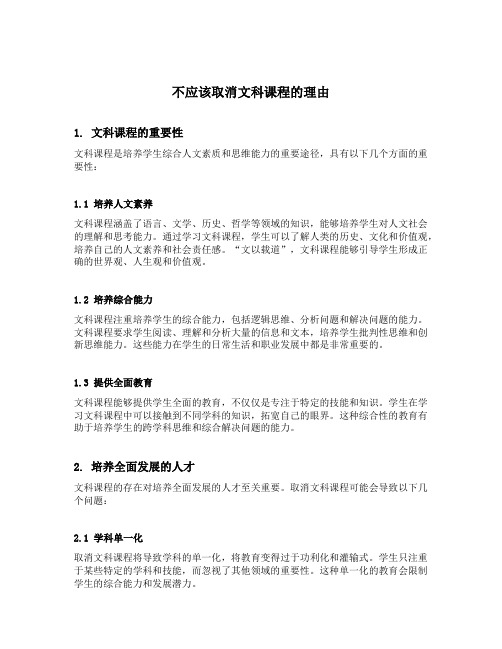
不应该取消文科课程的理由1. 文科课程的重要性文科课程是培养学生综合人文素质和思维能力的重要途径,具有以下几个方面的重要性:1.1 培养人文素养文科课程涵盖了语言、文学、历史、哲学等领域的知识,能够培养学生对人文社会的理解和思考能力。
通过学习文科课程,学生可以了解人类的历史、文化和价值观,培养自己的人文素养和社会责任感。
“文以载道”,文科课程能够引导学生形成正确的世界观、人生观和价值观。
1.2 培养综合能力文科课程注重培养学生的综合能力,包括逻辑思维、分析问题和解决问题的能力。
文科课程要求学生阅读、理解和分析大量的信息和文本,培养学生批判性思维和创新思维能力。
这些能力在学生的日常生活和职业发展中都是非常重要的。
1.3 提供全面教育文科课程能够提供学生全面的教育,不仅仅是专注于特定的技能和知识。
学生在学习文科课程中可以接触到不同学科的知识,拓宽自己的眼界。
这种综合性的教育有助于培养学生的跨学科思维和综合解决问题的能力。
2. 培养全面发展的人才文科课程的存在对培养全面发展的人才至关重要。
取消文科课程可能会导致以下几个问题:2.1 学科单一化取消文科课程将导致学科的单一化,将教育变得过于功利化和灌输式。
学生只注重于某些特定的学科和技能,而忽视了其他领域的重要性。
这种单一化的教育会限制学生的综合能力和发展潜力。
2.2 缺乏人文关怀文科课程能够培养学生的人文关怀能力,使他们成为具有同理心和社会责任感的人才。
取消文科课程可能导致学生对于社会和人类命运的关注度降低,丧失了对人文精神的尊重和理解。
2.3 缺乏综合解决问题的能力文科课程注重培养学生的综合思考和解决问题的能力。
取消文科课程将限制学生的思维发展,使他们在面对复杂问题时缺乏综合的解决方案。
这样的人才无法适应社会的发展和变化,也无法在竞争中脱颖而出。
3. 文科课程的现实意义文科课程对个人和社会的现实意义不可忽视。
以下几个方面说明了文科课程的现实价值:3.1 培养人的全面发展文科课程能够培养学生的道德情感、审美情趣和创造力。
大学取消人文学科是不利的英语作文
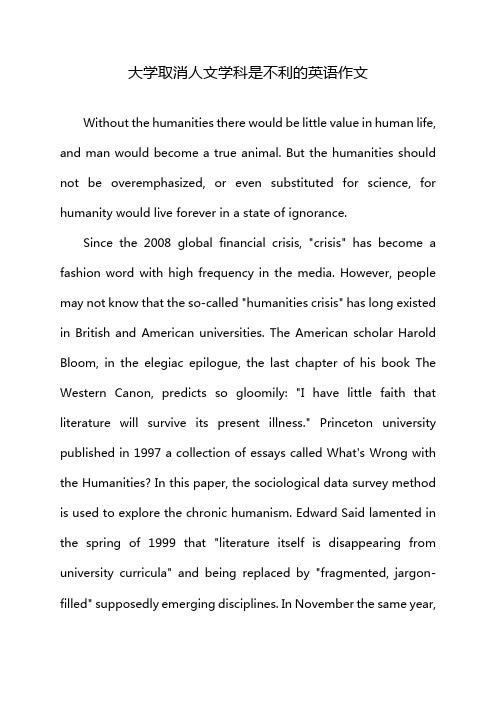
大学取消人文学科是不利的英语作文Without the humanities there would be little value in human life, and man would become a true animal. But the humanities should not be overemphasized, or even substituted for science, for humanity would live forever in a state of ignorance.Since the 2008 global financial crisis, "crisis" has become a fashion word with high frequency in the media. However, people may not know that the so-called "humanities crisis" has long existed in British and American universities. The American scholar Harold Bloom, in the elegiac epilogue, the last chapter of his book The Western Canon, predicts so gloomily: "I have little faith that literature will survive its present illness." Princeton university published in 1997 a collection of essays called What's Wrong with the Humanities? In this paper, the sociological data survey method is used to explore the chronic humanism. Edward Said lamented in the spring of 1999 that "literature itself is disappearing from university curricula" and being replaced by "fragmented, jargon-filled" supposedly emerging disciplines. In November the same year,the magazine of the New York review of books published durban's article "the decline and fall of literature", the title adopting the's book "the decline and fall of the Roman empire" "The end of literature is near," hillis Miller, a professor at the University of California, declares alarmingly in the opening sentence of His treatise, though he immediately adds a self-contradictory statement: "Although its end is not far, literature is eternal and universal."In British and American universities, the Department of English is increasingly in trouble, which is facing a reduction in administrative funding, a sharp drop in students, graduate employment and other fatal injuries. All this has left the once "high and dry" English department as the only marginalized and ridiculed department on campus. A visiting British university professor recently told me that the government's decision to base funding on the actual social benefits of the humanities had left liberal arts departments so financially strapped that they had to treble university tuition fees, prompting an outcry from students.Is the crisis in the humanities a phenomenon of the last decade or so, or has it already existed? What are the causes?In fact, the humanities have long been in crisis. As far back as Plato's Republic, Socrates advocated the expulsion of poets from his imagined republic lest they stir up vile desires in the guardians of the city. Plato claimed through Socrates: "We will not accept him in a city that expects good manners and good governance, because he awakens and nurtures the base part of the soul, makes it strong, and kills the rational part... We may say that the poet, who practises simulation, has thrust a bad regime into every individual's own soul, to please the unwise part of the soul..." Augustine, in his Confessions, accuses himself of neglecting spiritual cultivation by indulging in theatre. The English Renaissance poet Sidney defended his poetry against various Puritan attacks in his Poem Debate, and Shelley spared no effort to find the reason for the existence of poetry in the utilitarian and pragmatic era in his long essay of the same name... The "soft" humanities, which have been in retreat ever since "hard" subjects such as science were established in universities in the 19th century, seem to have no retreat from the more fashionable disciplines such as economics and management. They need to do some soul-searching to figure out their raison d 'etre and theirfuture direction.All of which suggests that the humanities are in a hostile environment all the time, or at least that they are regarded as dispensable cultural trimmings. Capitalism, in Eagleton's words, pays a little homage to culture by touching its brim.There are two main schools of accusation against the humanities. One is the moral charge, as Plato and later Christian defenders (Tolstoy is prominent among them). The second is the utilitarian charge, represented by the Four Ages of Poetry written by Peacock in the 19th century. In modern times, moral criticism of literature has given way to apathetic attitudes, driven by a cosmopolitan secularization and a relativism of moral principles, as Shakespeare loses out to Adam Smith in the ruthlessly pragmatic job market.As an independent subject in universities, English has a history of just over a century. In Britain, until the end of the 19th century, humanities education in universities was based on the transmission of ancient Greek, Roman and other classical language documents. It was not until the turn of the 20th century that the old, conservativeuniversities in Britain opened English departments and opened their own languages and literature. According to Eagleton, the English discipline served several purposes: to find a more time-consuming and labor-intensive way for the working class to receive an education, to provide more accessible subjects for the women who had recently crowded into universities, and to create a sense of national identity and export imperial cultural identity to British subjects. Readers will guess why Matthew Arnold, Oxford's first professor of poetry, delivered his inaugural address in English, not in the traditional Latin.One of the important reasons for the crisis of English discipline is its unclear orientation. As early as the end of 1950s, Canadian critic Frye pointed out the dilemma of literary criticism in his famous book Anatomy of Criticism: criticism relies on history on one side and philosophy on the other. Critics borrow events from history and ideas from philosophy. This dilemma of criticism is also a true portrayal of literature. Because in college English departments, the interpretation of a literary text must rely on the framework of a critical theory, rather than on personal taste and subjectiveimpression (which is typical of critics at the end of the 19th century) to deal with a work. Thanks to the advances in the natural sciences since the end of the 19th century, the humanities by contrast remain in the shadow of old ideas, as can be seen from how many years British and American critics have been talking about Plato's imitation and Aristotle's catharsis. In view of this, the modernist master T. S. Eliot advocated the "non-individuation" of art in his article Tradition and Individual Talent, and put forward the anti-romantic slogan: "The progress of an artist is a kind of continuous self-sacrifice, a kind of constant elimination of individuality". He believes that only in this kind of deindividuation can art approach the status of science. From Russian formalism to T. S. Eliot to F. Fry and later the "New Criticism," literary researchers have long dreamed of creating a science of the humanities that would rival the precise methods of the natural sciences. But since the 1960s and 1970s, this dream of establishing the humanities has been shattered by a barrage of political, feminist, and minority criticism, leaving the humanities in a "tower of Babel" chaos.Another important reason for the decline of English is theruthless pragmatism of Anglo-American capitalism. Russell devoted his book ode to Leisure to "useless knowledge". "In the last 150 years," he wrote, "the value of 'useless' knowledge has been increasingly debated, and the belief has grown that the only knowledge worth having is that which can be applied to some area of socio-economic life." Under the influence of this dominant ideology, the humanities are dwarfed by subjects with direct economic benefits such as marketing, and applicants' pure academic interests are swayed by the baton of employment, choosing only those subjects with better job prospects. In the era of market economy, celebrities have become invisible masses of consumers, and according to the cultural elite, the masses are "collective mediocrity."In recent decades, literary education in British and American universities has experienced the controversy of breaking the "Canon". There was no doubt in the minds of former educators what a Canon was. Eliot considered the Canon to be Greco-Latin literature, and for him the common measure of excellence in literature written in European languages was the classics. Schopenhauer wasobsessed with the classics and wrote: "Nothing refreshes us so much as reading the old classics... Read even half an hour... The spirit is purified, sublimated and strengthened. It feels like drinking from a mountain stream." In the Western Canon, Bloom relentlessly rebukes attempts by various contemporary schools of fashion criticism to open up the Canon and affirms the centrality of Shakespeare and Dante. Confusingly, however, over the past two or three decades English departments at British and American universities have courted fashion, offering a variety of courses that have nothing to do with Canon texts, and even calling for "cultural studies" to replace traditional literary studies. On the other hand, advocates of "political correctness" and feminism attacked the Canon as a product of WASP (i.e., white, Anglo-Saxon, Protestant) ideology, reflecting the dark motives of the ruling class to maintain its position. The writers in the Canon are almost all dead white men, rejecting female literary representation. It is not hard to imagine how a discipline can survive an existential crisis when even its core Canon is questioned.Since the 1960s, the theoretical wind blowing from continentalEurope has dealt a fatal blow to the English discipline. These theories are hard to understand, and the result is that college students spend too much time nibbling on them to read core literature. This situation is well illustrated by David Jeffrey, a fellow of the Royal Society of Canada, in Literary Studies in a Post-Theoretical Context: "Many of these critics... Worried about the decline of the literary discipline they had helped to precipitate, about the flight from literary works to the tenets of literary theory... These doctrines have become sectioned and have marginalised the discipline of literature in universities."In short, the predicament of humanities (English) discipline is caused by both internal and external factors. If we want to save the dying humanities, we must face up to these factors and try to find out the way to get rid of difficulties and revitalize humanities.。
大学应该取消人文学科吗 英语作文
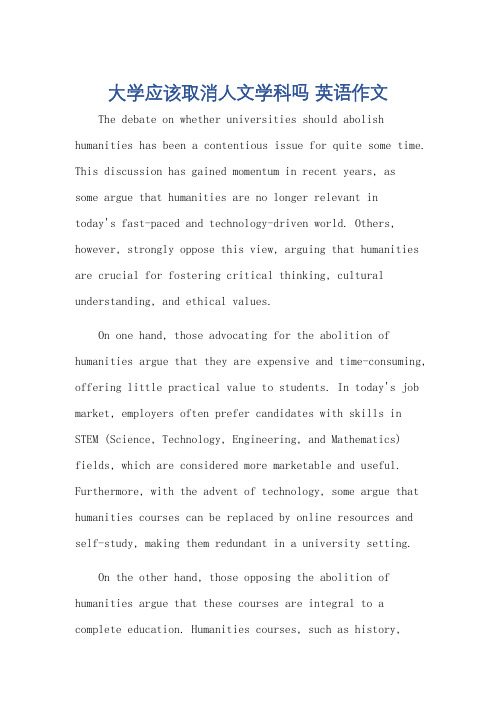
大学应该取消人文学科吗英语作文The debate on whether universities should abolish humanities has been a contentious issue for quite some time. This discussion has gained momentum in recent years, as some argue that humanities are no longer relevant intoday's fast-paced and technology-driven world. Others, however, strongly oppose this view, arguing that humanities are crucial for fostering critical thinking, cultural understanding, and ethical values.On one hand, those advocating for the abolition of humanities argue that they are expensive and time-consuming, offering little practical value to students. In today's job market, employers often prefer candidates with skills in STEM (Science, Technology, Engineering, and Mathematics) fields, which are considered more marketable and useful. Furthermore, with the advent of technology, some argue that humanities courses can be replaced by online resources and self-study, making them redundant in a university setting.On the other hand, those opposing the abolition of humanities argue that these courses are integral to a complete education. Humanities courses, such as history,literature, philosophy, and languages, foster critical thinking and analytical skills that are invaluable in any field. They help students understand different cultures and perspectives, fostering a sense of empathy and cultural awareness. Additionally, humanities courses instill ethical values and moral principles that are crucial for responsible citizenship.Moreover, humanities courses contribute to the development of a student's personal growth and identity. By studying humanities, students gain a deeper understanding of their own values, beliefs, and identities. This self-awareness is crucial for making informed decisions and leading meaningful lives.Furthermore, the argument that humanities are not marketable is shortsighted. While STEM fields may offer more immediate job opportunities, humanities graduates often find themselves in positions of leadership and influence. They are able to communicate effectively, think critically, and solve problems innovatively, skills that are invaluable in any field.In conclusion, while the debate on whether universities should abolish humanities is complex and multifaceted, itis clear that these courses play a crucial role in a complete education. Humanities courses foster critical thinking, cultural understanding, ethical values, and personal growth, skills that are invaluable in today's world. While technology and online resources may have changed the way we learn, they cannot replace the value ofa humanities education. Universities should continue tooffer a balance of STEM and humanities courses, ensuringthat students receive a well-rounded education thatprepares them for success in all aspects of life.**大学应该取消人文学科吗?**关于大学是否应该取消人文学科的辩论已经持续了一段时间。
传统文化在大学英语教学的缺失.docx

传统文化在大学英语教学的缺失一、注重中国传统文化的重要性中国传统文化在中国的历史长河里是具有非常重要的作用。
因为,它是历史文化先人经过长期的探索和反复的实践而得来的重要文化。
对于中国传统文化,我们可以取其精华,去其糟粕。
对于优秀的好的文化,我们可以传承和学习。
要把中国的传统文化继承发扬并学习,因为,它有着非常重要的意义。
对于优秀的传统文化,是可以渗透于文化教学中的。
因为,它也是经过历史名人不断探索而得来的结果。
具有非常源远流长的教育文化知识。
因此,作为中国传统文化在大学英语中的教学我们是必须要注重其本土化的教育,再注重国外的教学发展。
两者结合,才会使得英语教学有很好的发展。
我们要注重中国传统文化内在的渗透作用。
因为,对于英语教学来说,毕竟中国的学生不是外国人,在英语学习中还是有很大的学习缺陷的。
因此,这就需要我们要融合中国的传统文化进行教学。
二、中国传统文化在大学英语教学中的缺失1.过分的学习西方文化如今,在如此发达的经济发展中,中国人越来越多的喜欢去西方玩和学习,过分的学习和崇洋媚外有时候会出现反作用的。
因为,在如此日新月异的文化发展中,每天都在不断地更新。
慢慢的学生会忽视中国传统文化的存在,转而注重外来文化学习。
面对过分的学习西方文化是不正确的,我们要适当的学习,而不是过分的学习,而忽视我们中国传统的优秀文化。
2.对大学英语学习的片面化在大学英语教学中,有的学生对英语的学习认识是非常片面化的。
他们不能理解传统文化对国人的重要性。
而忽视了中国传统文化的认识。
在长久的学习中,学生只看见了英语对于走出国门的重要性。
认为英语是走出去的首要条件。
而对中国传统文化的不够重视,这样往往就会忽视了很多重要的东西。
我们在大学英语教学或学习上都应该以同等重要的态度,去重视[1]。
而不是只单纯的看见英语教学的片面化。
学习外来文化本身是一个非常好的一个学习过程,但是我们不可只关注外来的文化,而忽视了中国的传统文化的学习。
翻译在英语教学中的作用
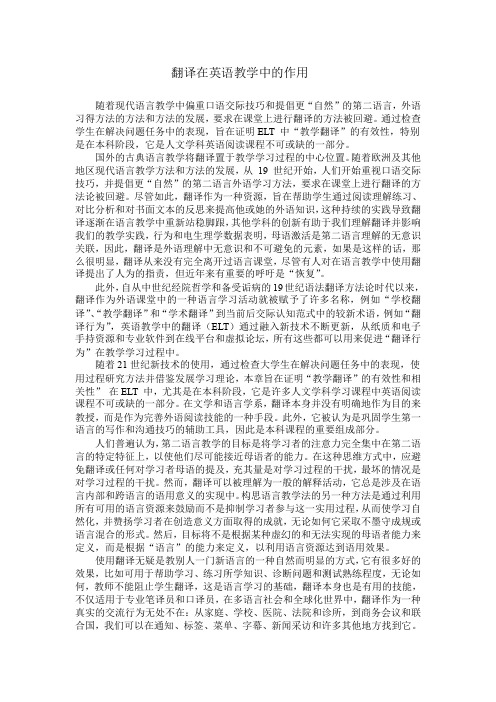
翻译在英语教学中的作用随着现代语言教学中偏重口语交际技巧和提倡更“自然”的第二语言,外语习得方法的方法和方法的发展,要求在课堂上进行翻译的方法被回避。
通过检查学生在解决问题任务中的表现,旨在证明ELT中“教学翻译”的有效性,特别是在本科阶段,它是人文学科英语阅读课程不可或缺的一部分。
国外的古典语言教学将翻译置于教学学习过程的中心位置。
随着欧洲及其他地区现代语言教学方法和方法的发展,从19世纪开始,人们开始重视口语交际技巧,并提倡更“自然”的第二语言外语学习方法,要求在课堂上进行翻译的方法论被回避。
尽管如此,翻译作为一种资源,旨在帮助学生通过阅读理解练习、对比分析和对书面文本的反思来提高他或她的外语知识,这种持续的实践导致翻译逐渐在语言教学中重新站稳脚跟,其他学科的创新有助于我们理解翻译并影响我们的教学实践,行为和电生理学数据表明,母语激活是第二语言理解的无意识关联,因此,翻译是外语理解中无意识和不可避免的元素,如果是这样的话,那么很明显,翻译从来没有完全离开过语言课堂,尽管有人对在语言教学中使用翻译提出了人为的指责,但近年来有重要的呼吁是“恢复”。
此外,自从中世纪经院哲学和备受诟病的19世纪语法翻译方法论时代以来,翻译作为外语课堂中的一种语言学习活动就被赋予了许多名称,例如“学校翻译”、“教学翻译”和“学术翻译”到当前后交际认知范式中的较新术语,例如“翻译行为”,英语教学中的翻译(ELT)通过融入新技术不断更新,从纸质和电子手持资源和专业软件到在线平台和虚拟论坛,所有这些都可以用来促进“翻译行为”在教学学习过程中。
随着21世纪新技术的使用,通过检查大学生在解决问题任务中的表现,使用过程研究方法并借鉴发展学习理论,本章旨在证明“教学翻译”的有效性和相关性”在ELT中,尤其是在本科阶段,它是许多人文学科学习课程中英语阅读课程不可或缺的一部分。
在文学和语言学系,翻译本身并没有明确地作为目的来教授,而是作为完善外语阅读技能的一种手段。
双语教育在中国是否应该被鼓励?
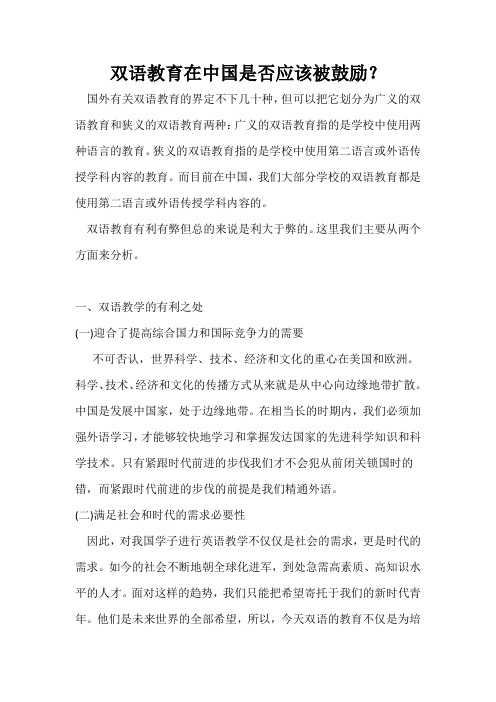
双语教育在中国是否应该被鼓励?国外有关双语教育的界定不下几十种,但可以把它划分为广义的双语教育和狭义的双语教育两种:广义的双语教育指的是学校中使用两种语言的教育。
狭义的双语教育指的是学校中使用第二语言或外语传授学科内容的教育。
而目前在中国,我们大部分学校的双语教育都是使用第二语言或外语传授学科内容的。
双语教育有利有弊但总的来说是利大于弊的。
这里我们主要从两个方面来分析。
一、双语教学的有利之处(一)迎合了提高综合国力和国际竞争力的需要不可否认,世界科学、技术、经济和文化的重心在美国和欧洲。
科学、技术、经济和文化的传播方式从来就是从中心向边缘地带扩散。
中国是发展中国家,处于边缘地带。
在相当长的时期内,我们必须加强外语学习,才能够较快地学习和掌握发达国家的先进科学知识和科学技术。
只有紧跟时代前进的步伐我们才不会犯从前闭关锁国时的错,而紧跟时代前进的步伐的前提是我们精通外语。
(二)满足社会和时代的需求必要性因此,对我国学子进行英语教学不仅仅是社会的需求,更是时代的需求。
如今的社会不断地朝全球化进军,到处急需高素质、高知识水平的人才。
面对这样的趋势,我们只能把希望寄托于我们的新时代青年。
他们是未来世界的全部希望,所以,今天双语的教育不仅是为培养高水平人才而进行的,也是为了提高我们的全民素质水平。
而且,双语教育是一种积极的益智活动,对学生的语言、认知发展起到一定的促进作用。
(三)满足了学生未来发展的需要科研工作、获取信息、出国深造都离不开高超的英语水平。
过去人们常说“学会数理化,走遍天下都不怕”,现在人们常说“掌握英语和计算机,走遍天下都不怕。
”尽管这种说法过于偏激,但是精通英语已经成为学生未来发展的重要素质。
(四)双语学习对幼儿的发展具有极大的影响1.双语学习能促进幼儿语言的发展第二语言的学习向幼儿展示了另一套与母语完全不同的语言符号系统,可以促进幼儿语言能力的发展。
第二语言的学习可以使幼儿逐渐产生对两种语言之间差异的敏感性和对语言符号本身结构的敏感性,其直接结果是幼儿开始将语言看作他们头脑中已经拥有的诸多系统中的一一个特殊系统,从而提高了他们的语言操作能力和交往能力,使幼儿学到地道、纯正的第二语言。
- 1、下载文档前请自行甄别文档内容的完整性,平台不提供额外的编辑、内容补充、找答案等附加服务。
- 2、"仅部分预览"的文档,不可在线预览部分如存在完整性等问题,可反馈申请退款(可完整预览的文档不适用该条件!)。
- 3、如文档侵犯您的权益,请联系客服反馈,我们会尽快为您处理(人工客服工作时间:9:00-18:30)。
“We are drowning in information, while starving for wisdom.”“世人被知识压死,智慧却少得很。
”That epigram from E.O. Wilson captures the dilemma of our era. Yet the solution of some folks is to disdain wisdom. E·O·威尔逊( E.O. Wilson)一语道破了我们这个时代的困境。
但一些人给出的应对之道竟是鄙弃智慧。
“Is it a vital interest of the state to have more anthropologists?” Rick Scott, the Florida governor, once asked. A leader of a prominent Internet company once toldme that the firm regards admission to Harvard as a useful heuristic of talent, but a college education itself as useless. “拥有更多人类学家是本州的关键利益所在吗?”佛罗里达州州长里克·斯科特(Rick Scott)曾经这样问道。
某著名互联网公司的负责人曾经告诉我,该公司把哈佛大学的录取通知书当成一个人是否有才的具有启发性的有用依据,但并不认为大学教育本身有什么参考价值。
Parents and students themselves are acting on these principles, retreating from the humanities. Among college graduates in 1971, there were about two business majors for each English major. Now there are seven times as many. (I was a political science major; if I were doing it over, I’d be an economics major with a foot in the humanities.) 学生和家长们正按照这类准则行事,纷纷摒弃人文学科。
1971年,商科本科毕业生和英语系本科毕业生的比例是2:1。
现在,两者的比例是7:1。
(我学的是政治学专业;如果可以重来一次,我会去学经济学,同时选修人文学科。
)I’ve been thinking about this after reading Fareed Zakaria’s smart new book,“In Defense of a Liberal Education.” Like Zakaria, I think that the liberal arts teach critical thinking (not to mention nifty words like “heuristic”). 自从读了法里德·扎卡里亚(Fareed Zakaria)颇有见地的新书《捍卫人文教育》(In Defense of a Liberal Education)之后,我一直在思考这一现象。
和扎卡里亚一样,我认为人文教育有助于培养学生的批判性思维(具有“启发性”等漂亮话就更不用说了)。
So, to answer the skeptics, here are my three reasons the humanities enrich our souls and sometimes even our pocketbooks as well. 人文学科可以丰富我们的精神生活,有时甚至可以充实我们的钱袋子。
为了回应怀疑论者,我在此给出三点理由。
First, liberal arts equip students with communications and interpersonal skills that are valuable and genuinely rewarded in the labor force, especially when accompanied by technical abilities. 首先,人文教育有助于提高学生的沟通和人际交往能力,在职场上,这种能力可以给人带来巨大的回报,尤其是在跟技术能力共同起作用的时候。
“A broad liberal arts education is a key pathway to success in the 21st-century economy,” says Lawrence Katz, a labor economist at Harvard. Katz says that the economic return to pure technical skills has flattened, and the highest return now goes to those who combine soft skills — excellence at communicating and workingwith people — with technical skills. “在21世纪的经济体系中,宽泛的人文教育是通往成功的重要途径,”哈佛大学的劳动经济学家劳伦斯·卡茨(Lawrence Katz)说。
卡茨称,纯技术能力的经济回报已经趋平,既具有软能力——善于与他人交流和协同工作——又具有技术能力的人获得的回报是最高的。
“So I think a humanities major who also did a lot of computer science, economics, psychology, or other sciences can be quite valuable and have great career flexibility,” Katz said. “But you need both, in my view, to maximize your potential. And an economics major or computer science major or biology or engineering or physics major who takes serious courses in the humanities and history also will be a much more valuable scientist, financial professional, economist, or entrepreneur.”“因此我认为,一个人文专业的学生,如果对计算机科学、经济学、心理学或者其他学科也颇有研究,就会很有价值,在职场是会有很大的灵活性的。
”卡茨说,“但在我看来,你必须‘脚踏两只船’,才能最大限度地挖掘自己的潜能。
一个经济学专业的学生,或者是计算机专业、生物学专业、工程学专业、物理学专业的学生,如果正经八百地修过人文和历史课程,也会成为一个更有价值的科学家、金融专业人士、经济学家或者企业家。
”My second reason: We need people conversant with the humanities to help reach wise public policy decisions, even about the sciences. Technology companies must constantly weigh ethical decisions: Where should Facebook set its privacy defaults, and should it tolerate glimpses of nudity? Should Twitter close accounts that seem sympathetic to terrorists? How should Google handle sex and violence, or defamatory articles? 我的第二个理由:我们需要通晓人文学科的人来帮忙做出明智的公共政策决策——甚至是和科学有关的决策。
科技公司必须不断对伦理决策进行权衡:Facebook的默认隐私设置应该是什么样的,该容忍些许裸体影像的存在吗?Twitter该关停似乎对恐怖分子颇为同情的账号吗?谷歌(Google)该如何处理关于性与暴力的内容以及诽谤性文章?In the policy realm, one of the most important decisions we humans will have to make is whether to allow germline gene modification. This might eliminate certain diseases, ease suffering, make our offspring smarter and more beautiful. But it would also change our species. It would enable the wealthy to concoct superchildren. It’s exhilarating and terrifying. 在政策领域,我们人类必须做出的一个最为重要的决定:是否允许修正人类生殖细胞基因。
人类生殖细胞基因修正或许可以消灭特定种类的疾病,减少痛苦,让我们的后代更聪明、更美丽。
但它同时也会改变我们这个物种,会让富人有机会炮制出犹如超人的子女。
这真是既令人振奋,又透着恐怖。
To weigh these issues, regulators should be informed by first-rate science, but alsoby first-rate humanism. After all, Homer addressed similar issues three millenniums ago. 要权衡这类问题,监管者不仅要具有一流的科学素质,还要具有一流的人文素质。
毕竟,早在3000年前,荷马(Homer)就提出过类似的问题。
